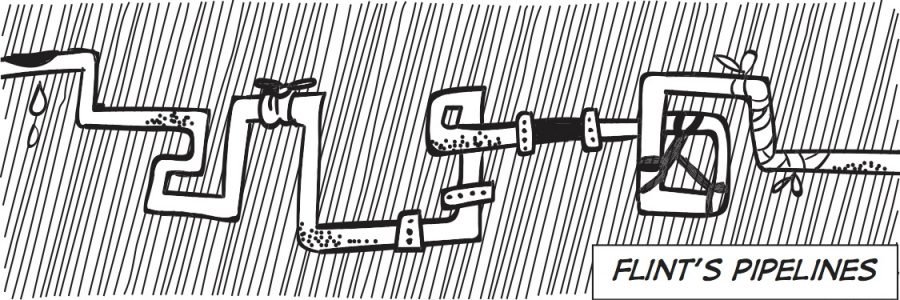Flint residents continue struggle for a basic human right
Cooking and cleaning up from Thanksgiving dinner was complicated for the residents of Flint, Michigan who had to rely on bottled water to cook and clean as they could not access clean, running water. Christmas will be more of the same.
Residents have not had clean tap water for over two years, requiring the city’s inhabitants use bottled water as a replacement for contaminated tap water.
The issue started in 2014 when the city switched its water supply from Lake Huron to the Flint River, known by locals at that time to be filthy, according to CNN.
Flint resident Lee-Anne Walters reached out to the Environmental Protection Agency a few months after the switch, claiming that dark contaminants in her family’s tap water might be making her children sick. After being tested, her drinking water had 104 parts per billion (ppb) lead, almost seven times higher than the EPA’s acceptable limit of 15.
Walters’ water was retested by the EPA about two months later. The lead content rose to 397 ppb.
Water contaminants can lead to adverse health effects — including gastrointestinal illness, reproductive problems and neurological disorders — according to the Centers for Disease Control and Prevention.
Children under the age of 6 are extremely susceptible to lead poisoning, which can have a devastating impact on physical and mental development, ranging from learning difficulties to hearing loss, according to the Mayo Clinic. These lifelong issues are a result of simply need to stay hydrated.
After testing 252 homes for lead poisoning, a team from Virginia Tech reported “preliminary tests show ‘serious’ levels of lead in city water.”
Several samples exceeded 100 ppb, and one sample collected after 45 seconds of flushing exceeded 1000 ppb.
Humans need water for survival, and they deserve access to clean, drinkable water that doesn’t put them at risk of illness or even death. By switching water sources, Flint’s city council potentially endangered citizens’ lives.
Flint’s mayor, the Michigan governor, the EPA and the President of the United States all declared Flint to be in a state of emergency from December 2015 through January 2016 — yet 2016 ends in nearly three weeks and Flint still does not have clean drinking water.
The Senate overwhelmingly passed the Water Resources Development Act, 95-3 in September, reserving $9 billion to aid communities with contaminated water and allots $270 million to specifically assist residents of Flint, but does not include immediate aid for the city.
In an unrelated event, the Dakota Access Pipeline, a proposed 1,172 mile crude oil conduit was denied a final permit on Sunday. The pipeline would have crossed land Native Americans hold sacred, as well as a major water source for Standing Rock Reservation. Representatives from over 100 Native American tribes protested its construction while individuals across the United States joined the protest either on-site or through crowd-funding campaigns and social media to show solidarity with protesters.
If we unite behind Flint just as we did for Standing Rock through donations, protests, signing petitions and awareness — and say that the government jeopardizing access to clean water is unacceptable — then change will happen.
Supporters can donate to people bringing clean water to Flint families, such as The Flint Water Fund at http://www.unitedwaygenesee.org/flintwaterfund, or sign a petition for residents to stop paying water bills for contaminated water at https://www.change.org/p/rick-snyder-stop-making-flint-residents-pay-for-poisoned-water.








